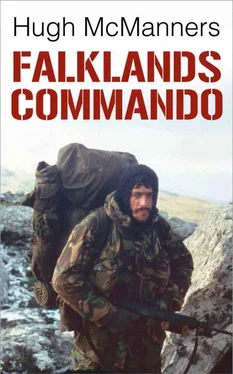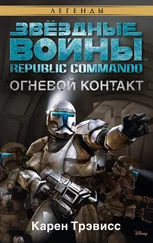Hugh McManners - Falklands Commando
Здесь есть возможность читать онлайн «Hugh McManners - Falklands Commando» весь текст электронной книги совершенно бесплатно (целиком полную версию без сокращений). В некоторых случаях можно слушать аудио, скачать через торрент в формате fb2 и присутствует краткое содержание. Город: London, Год выпуска: 2014, ISBN: 2014, Издательство: Nightstrike Publishing, Жанр: nonf_military, Биографии и Мемуары, на английском языке. Описание произведения, (предисловие) а так же отзывы посетителей доступны на портале библиотеки ЛибКат.
- Название:Falklands Commando
- Автор:
- Издательство:Nightstrike Publishing
- Жанр:
- Год:2014
- Город:London
- ISBN:978-0-992-81540-0
- Рейтинг книги:4 / 5. Голосов: 1
-
Избранное:Добавить в избранное
- Отзывы:
-
Ваша оценка:
- 80
- 1
- 2
- 3
- 4
- 5
Falklands Commando: краткое содержание, описание и аннотация
Предлагаем к чтению аннотацию, описание, краткое содержание или предисловие (зависит от того, что написал сам автор книги «Falklands Commando»). Если вы не нашли необходимую информацию о книге — напишите в комментариях, мы постараемся отыскать её.
Falklands Commando — читать онлайн бесплатно полную книгу (весь текст) целиком
Ниже представлен текст книги, разбитый по страницам. Система сохранения места последней прочитанной страницы, позволяет с удобством читать онлайн бесплатно книгу «Falklands Commando», без необходимости каждый раз заново искать на чём Вы остановились. Поставьте закладку, и сможете в любой момент перейти на страницу, на которой закончили чтение.
Интервал:
Закладка:
Peacetime COs have very different aims and motives from wartime COs. In peace they command for a fixed period of time. Ambitious men therefore ride their regiments hard for two and a half years, ensuring that everything looks good, so that they do well personally and receive good confidential reports. Some may not be interested in knowing what’s really wrong inside their battalions, just so long as their superiors are happy with what they see. Such personal ambition is usually accompanied by the ruthless will to ensure that no mistakes are made that could be blamed on them while they are in command. For peacetime brigade commanders (sweating on getting a clean sheet from their brigades), trouble-free units are clearly preferable; their COs must be reliable and therefore predictable. Some peacetime COs find it much easier to be sociable to superiors while keeping a distance from subordinates. They may even deliberately make their soldiers frightened of them, using their personal power and rank as a weapon of subjugation. One CO told me he did this as part of conditioning his men for combat: ‘If they’re frightened of me, they won’t be frightened of the Russians.’
By contrast, popularity in the Israeli Defence Force is considered a particularly important leadership quality. Popularity is formally measured as a ‘peer rating’, which includes frank appraisals from all members of the unit. Most pilots (for example) emerge at the end of their training and selection as men who have proved themselves very popular with everyone – almost celebrities. By setting such stock on peer rating, the IDF ensure that their soldiers are led by officers they respect, rather than by those appointed from above. The IDF officer caste is thus not artificially elevated, nor are its leaders and followers distanced from each other in the way the British Army believes necessary.
In war, it’s essential that every person in a unit trusts the Commanding Officer. For this trust to develop, the CO must have some kind of sensible and genuine relationship with his officers, NCOs and soldiers. In terms of personal qualities, the basic essential is integrity of character; if a CO is really a shy, aloof person, it cuts no ice for him to pretend he is something different. He must also be honest with his soldiers – ‘straight’ as they put it. The best wartime COs are genuinely concerned and approachable, but also ruthless enough in battle to force their men to do things they don’t want to do.
In good units, the ruthlessness works both ways; Private Nick Taylor of 2 Para comments on his CO Lt Col ‘H’ Jones, about when he was killed during the battle for Darwin Goose Green in the Falklands War:
“‘H’ Jones wasn’t really discussed afterwards. He’d been doing the right thing, the thing we expected of him – doing his job. He knew most people’s surnames, and knew most of us pretty well. He talked to us at our level, whereas some of them don’t even bother their arses. During the battle, when he was killed, I just thought, ‘Tough’”.
Some men have a need to be liked. Others are shy. Both these characteristics can create pressure, and cannot be eradicated by military training. The best training can achieve is to force the individual to adopt some kind of defence mechanism to hide what in the army (and in some other careers) are considered personal weaknesses. Problems arise through the behavioural artificiality of the defence mechanisms, which can appear to subordinates as irrational behaviour.
Beyond the rank of lieutenant colonel, isolation from ordinary soldiers and the real military world becomes an increasing problem. Successful commanders in peacetime armies are able to organise things both at unit level dealing with soldiers, and in staff HQs dealing with paperwork. To be promoted to high rank in peacetime, senior officers must be able to run a neat, efficient office, which is a far cry from fighting battles. The prime quality for officers working in headquarters is good organisation, which in the army is judged by producing accurate work on time, and being good with fine detail – the vital ‘nitty gritty’ of plans. This starts from the very beginning, at Sandhurst where officer cadets are constantly urged to ‘pay attention to detail’. Appearances are important too, taken as signs of underlying efficiency: neat handwriting, a tidy desk – some of the indicators psychologist Norman Dixon says point towards obsessional personalities.
It is however entirely reasonable for good organisers, in whatever walk of life, to have clear ‘In’ and ‘Out’ trays, to think ahead and to be reliable and predictable. But in the civilian world, the sort of ‘good organisation’ some senior officers insist on could be regarded as unreasonable and obsessional. Nevertheless, military headquarters are different; doing things exactly to the letter is very important, particularly in war when men’s lives depend on getting it right under pressure.
Norman Dixon’s theory of increasing obsessional behaviour in military officers as they are promoted, although a generalisation, does however help illustrate what life can be like within military organisations. He argues that obsessional personalities do well in peacetime; they ensure that things are done exactly correctly, follow orders to the letter, and are very dedicated.
Unfortunately, obsessional people contain within them the seeds of their own destruction. As officers progress up the military tree, the more each job increases in complexity – especially in terms of low-level politics. The pressure builds as well – particularly for the obsessional who cannot do everything himself, but is forced to delegate to others. According to Dixon, he therefore visits his obsessions on subordinates, who are told to do things in exactly the way he would do them himself. Their work never reaches his standards, so the obsessed senior officer spends more time on the backs of his subordinates checking their work than he does working himself, becoming unpopular in the process. Eventually, in his crusade to be better organised (and get himself promoted), the obsessional reaches the point where he cannot cope, ultimately giving up, or becoming depressed and falling ill. It’s a no-win situation.
Dixon says that in peacetime, senior officers get to the top through being obsessional; but when obsession gets the better of them, are left stranded beyond their true capabilities. With no other personal abilities to fall back on, such individuals can only struggle, each reaching what Dixon calls ‘their own level of incompetence’.
Although as I’ve already argued, I feel that Dr Dixon exaggerates, there is something of the obsessional in most successful staff officers. In all armies, selection for promotion is through the personal recommendations of superiors. Because obsessionals insist that work be done in exactly the same manner that they themselves would do it, they choose fellow obsessionals, or at least people with similar characteristics to their own, for promotion. Once an officer reaches the rank of brigadier, the generals who decide which brigadiers will become major generals will probably know him well. Promotion to lieutenant general and higher is even more based upon personal knowledge. The top men choose people like themselves as their successors; reliable, neat, logical men, who pay attention to detail.
At the end of a military career, letting go can be difficult. For some, retiring from the army can be very depressing. A former RSM finds himself a nobody in the outside world, suddenly devoid of rank and power, and without any sort of status. Military discipline does not work in Civvy Street; shouting at subordinates is more likely to start a fight than to get the job done. The more military minded an individual has become (‘khaki-brained’), the harder it is for him to leave the army. As a result, significant numbers of retiring officers prefer to stay under the military umbrella after retirement age, in underpaid, often mundane, Retired Officer posts.
Читать дальшеИнтервал:
Закладка:
Похожие книги на «Falklands Commando»
Представляем Вашему вниманию похожие книги на «Falklands Commando» списком для выбора. Мы отобрали схожую по названию и смыслу литературу в надежде предоставить читателям больше вариантов отыскать новые, интересные, ещё непрочитанные произведения.
Обсуждение, отзывы о книге «Falklands Commando» и просто собственные мнения читателей. Оставьте ваши комментарии, напишите, что Вы думаете о произведении, его смысле или главных героях. Укажите что конкретно понравилось, а что нет, и почему Вы так считаете.












